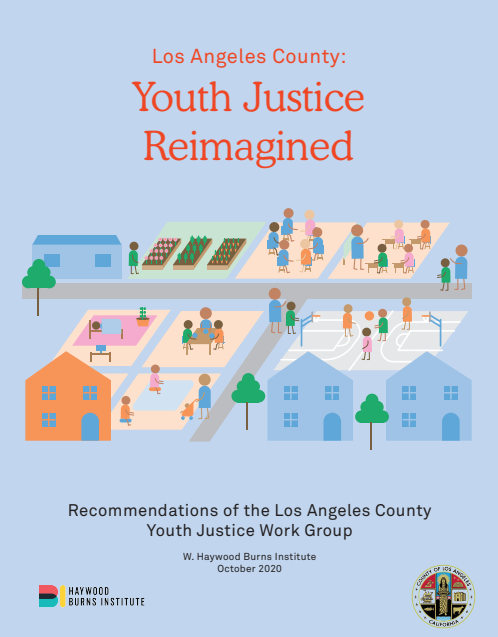KEY MOTIONS & REPORTS
Local Emergency Resulting from the Suitability Issues at Los Padrinos Juvenile Hall
On December 17, 2024, the Board of Supervisors proclaimed a local emergency related to the conditions of extreme peril to the safety of persons and property caused by the efforts of the Board of State and Community Corrections and others to close Los Padrinos Juvenile Hall (LPJH). This motion included a directive for the Department of Youth Development (DYD) to report back to the Board with the number of community-based facilities and total number of beds provided in each facility, including the number of beds currently available, for youth who could be released by the Probation Department.
Click here to read DYD’s initial report-back on bed availability.
Youth Development Programming for Justice-Involved Youth and Safe Healing Center Demonstration Projects
One of three youth justice motions passed by the Board of Supervisors on March 21, 2023, this motion included the following directives for the Department of Youth Development:
- Directive 2 – to propose a first phase of implementation for Safe Healing Centers that serve youth pre-adjudication and post-disposition;
- Directive 6 – to take the lead role in establishing programs and services in the Juvenile Halls and Probation Camps; and
- Directive 7 – to develop a longer-term, comprehensive plan to shrink the footprint of probation and a phased implementation plan to build the capacity to serve all justice-involved youth.
Click here to see all reports submitted in response to each directive of this motion, including DYD’s report on Safe Healing Centers (page 74) and youth development programming in Juvenile Halls and Probation Camps (page 81). DYD plans to complete our report for Directive 7 in 2024.
Decarceration of Girls and Gender Expansive Youth
In November 2021, this motion directed the Youth Justice Advisory Group and a collaborative group of stakeholders to develop a recommended plan to decarcerate girls and young women in the County’s Juvenile Halls and Probation Camps.
Click here to see the collaboratively developed implementation plan DYD submitted to the Board of Supervisors in May 2023.
Addressing Emergent Illicit Substances in Juvenile Hall
Passed by the Board on March 7, 2023, this motion included a directive to DYD, in collaboration with the Office of the Inspector General, and Probation Oversight Commission, to report back with an implementation plan for programs centered on reducing substance use by youth in Juvenile Halls and Probation Camps.
Click here to see the reports submitted for this motion, including the report submitted by DYD in April 2023.
Credible Messenger Pilot Program and Expansion
Initial planning and design for the Credible Messenger transformative mentorship program model was connected to a March 2022 motion titled “Preparing for the Closure of the Division of Juvenile Justice: Secure Youth Track Facility Designation and LA Model Expansion.” In October 2022, a motion titled “Supporting the Programming and Transition of Secure Track Youth to Secure Track Facilities” directed DYD to launch a Credible Messenger Pilot Program.
In December 2022, a motion titled “Phase Out of Oleoresin Capsicum (OC) Spray at Central Juvenile Hall” further directed DYD to expand the Credible Messenger Pilot Program to two additional populations: girls and gender expansive youth and developmentally disabled youth.
Improving School Climate and Safety
Passed by the Board of Supervisors in June 2022, this motion directed DYD to work with school districts located in the Second Supervisorial District to discuss the possibility of providing youth diversion services, youth development services, and training in restorative practices.
YOUTH JUSTICE REIMAGINED

In 2020, the Los Angeles County Board of Supervisors established the Youth Justice Work Group, a collaborative planning process that included system-impacted youth, community-based organizations, all youth-serving County Departments, the Public Defender and Alternate Public Defender’s Office, District Attorney’s Office, Probation Department, and experts from other jurisdictions. The Board tasked the Work Group with exploring the feasibility of transitioning to a transformational care-first model for youth justice that would achieve meaningful improved outcomes compared to the existing system.
The Work Group’s final report is titled “Los Angeles County: Youth Justice Reimagined” and it includes the collaborative recommendations for a vision, values, and phased implementation of a high-level plan for transitioning to a care-first approach to youth justice transformation and youth development.
Quarterly Update
In June 2023, the Department of Youth Development submitted our latest quarterly update on the progress achieved towards the vision and phased recommendations of the Youth Justice Reimagined Initiative. This update includes an outline of the status of recommendations in Phase 1 and Phase 2 of the Youth Justice Reimagined Report (see pages 3 and 4 for more detail).

